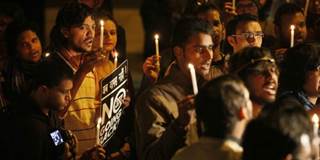Section 377 of India's penal code – which criminalizes “whoever voluntarily has carnal intercourse against the order of nature with any man, woman, or animal" – is a tool for the harassment, persecution, and blackmail of sexual minorities within India. Its repeal is long overdue, and now the Supreme Court should do just that.
NEW DELHI – Sixty-six years after adopting one of the world’s most liberal constitutions, India is being convulsed by a searing debate over a colonial-era provision in its penal code, Section 377, which criminalizes “whoever voluntarily has carnal intercourse against the order of nature with any man, woman, or animal.” Though not widely used – there were 578 arrests under Section 377 last year – the law is a tool for the harassment, persecution, and blackmail of sexual minorities within India. It must be changed.
Beyond forcing millions of gay men and women to live in fear and secrecy, Section 377 has undermined HIV-prevention efforts and contributed to depression and suicides. A 2014 study by the World Bank revealed that India suffers a loss of between 0.1% and 1.7% of GDP because of homophobia.
The issue is not one of sex, but of freedom. By giving the state the authority to control what Indian adults do, consensually, in their bedrooms, Section 377 violates the constitutional rights to dignity, privacy, and equality enshrined in Articles 14, 15, and 21, respectively. As the Nobel laureate Amartya Sen has observed, “The criminalization of gay behavior goes not only against fundamental human rights, but it also works sharply against the enhancement of human freedoms in terms of which the progress of human civilization can be judged.”

NEW DELHI – Sixty-six years after adopting one of the world’s most liberal constitutions, India is being convulsed by a searing debate over a colonial-era provision in its penal code, Section 377, which criminalizes “whoever voluntarily has carnal intercourse against the order of nature with any man, woman, or animal.” Though not widely used – there were 578 arrests under Section 377 last year – the law is a tool for the harassment, persecution, and blackmail of sexual minorities within India. It must be changed.
Beyond forcing millions of gay men and women to live in fear and secrecy, Section 377 has undermined HIV-prevention efforts and contributed to depression and suicides. A 2014 study by the World Bank revealed that India suffers a loss of between 0.1% and 1.7% of GDP because of homophobia.
The issue is not one of sex, but of freedom. By giving the state the authority to control what Indian adults do, consensually, in their bedrooms, Section 377 violates the constitutional rights to dignity, privacy, and equality enshrined in Articles 14, 15, and 21, respectively. As the Nobel laureate Amartya Sen has observed, “The criminalization of gay behavior goes not only against fundamental human rights, but it also works sharply against the enhancement of human freedoms in terms of which the progress of human civilization can be judged.”